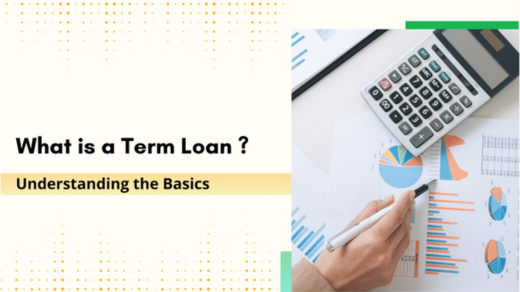What is a Term Loan? Understanding the Basics

Term loans are immediate, up front financing sources for local and small businesses that extend over a long time. These loans are long-term debts raised by companies that come with a schedule for payments and interests paid in installments at fixed or floating rates. However, such loans are not granted to businesses without sound financial statements along with promises of creditworthiness. Quick personal loans are beneficial to overcome financial constraints.
Understanding Term Loans
- Term loans are advantageous by virtue of the duration for loan repayment with an interest. Short-term loans usually wind up the principal from the borrower in under a year, however term loans offer them the time to arrange funds as well as pay in measured installments. Quick personal loans are frequently taken at the time of buying fixed assets such as machinery or buildings, as well as at the beginning of projects, which needs an overall capital along with time to avail the returns on such investments. Term loans mitigates that.
- Term loans can be easily allowed for a single year or prolonged for a period of 25 years. It lowers capital crunch in the businesses. They are also secured borrowings, as well as the assets are frequently put up as the security or collateral against payment to make sure that payments are easily being made when scheduled. Such loans are usually preferred sources of funding for various entities as they do not necessarily dilute the management for instance equity or bonds or the debt financing.
Highlights of Term Loans
- Term loans are of three types: short term loans, intermediate term loans as well as the long term loans.
- Proper payments at any scheduled times in the installments boost the scores of credit along with creditworthiness of businesses.
- Term loans are advantageous in terms of availing immediate capital while beginning a novel project or vying to reach an immediate goal.
- Nonetheless, they usually need rigorous approval as well as need proper primary security, frequently the new project itself or an asset as collateral security to absolve on defaulting the payment on these maturity in order to lower the risk.
- Nevertheless, quick personal loans can be easily paid off prior to scheduling along with carrying no penalties either.
Understanding Term Loans
Term loans are generally granted to small businesses that require capital to buy equipment, a novel building for the production processes, or any other necessary fixed assets to keep the businesses going. Certain businesses borrow the capital they require to operate on a month-to-month basis. Various banks have established quick personal loan programs specifically to assist the companies in such a way.
Business owners tend to apply for term loans the same way they would any other credit facility—by approaching their lender. They must offer statements and other financial evidence demonstrating their creditworthiness. Approved borrowers get a great amount of cash and are needed to make payments over a certain period of time, gradually on a monthly or quarterly repayment schedule.
Term loans carry a fixed or variable rate of interest as well as a set maturity date. If the proceeds are utilized to finance the buying of an asset, the useful life of that asset can certainly impact the repayment schedule. Such a loan needs collateral and a rigorous approval process to reduce the risk of default or potential failure to make payments. As mentioned above, certain lenders may need down payments prior to advancing the loan.
Borrowers frequently choose the kind of term loans for numerous reasons, involving:
- Simplified process of application
- Receiving an upfront lump sum of cash
- Particularly specified payments
- Reduced interest rates
Availability out a term loan also frees up capital from a company’s cash flow in order to utilize it elsewhere.
Types of Term Loans
Term loans come in numerous varieties, gradually reflecting the lifespan of the loan. These involve:
- Short-term loans: such kinds of term loans are typically provided to firms that don’t qualify for a credit line. They generally run less than a year, though they can also refer to a loan of up to a period of 18 months.
- Intermediate-term loans: such loans usually run between one to three years as well as are paid in monthly installments from a company’s capital flow.
- Long-term loans: such loans last anywhere between three to 25 years. They utilize company assets as collateral along with requiring monthly or quarterly payments from profits or capital flow. They also limit other financial commitments the company might take on, involving other debts, or principals’ salaries, as well as can require an amount of profit set aside specifically for loan repayment.
Both short- and intermediate-term loans may also be balloon loans along with balloon payments.
Example of a Term Loan
An SBA loan, generally known as a 7(a) guaranteed loan, encourages long-term financing. Short-term loans along with revolving credit lines are also available to assist with a company’s immediate along with a cyclical working capital needs.
As with any loan, an SBA fixed-rate loan payment remains similar as the rate of interest is constant. Conversely, a variable-rate loan’s payment amount can vary since the rate of interest fluctuates. A lender may establish an SBA loan with interest-only payments during a company’s startup or expansion phase. In a nutshell, the business has time to generate income prior to making full loan payments. As most SBA loans do not allow balloon payments.
The SBA charges the borrower a prepayment fee only if the loan has a maturity of a period of 15 years or longer. Business as well as personal assets secure every loan until the recovery value equals the amount of loan or until the borrower has pledged all assets as readily available.
What Are the Types of Term Loans?
Term loans tend to come in numerous varieties, gradually reflecting the lifespan of the loan. A short-term loan, generally provided to firms that don’t qualify for a creditline, runs less than a year, though it can also refer to a loan of up to a period of 18 months or so. An intermediate-term loan usually runs more than one to three years. It is paid in monthly installments from a company’s capital flow. A long-term loan runs for a period of three to 25 years, utilizes company assets as collateral as well as it requires monthly or quarterly payments from profits or capital flow.
What Are the Common Attributes of Term Loans?
Term loans usually carry a fixed or variable rate of interest, a monthly or quarterly repayment schedule, along with a set maturity date. If the loan is utilized to finance an asset purchase, the useful life of such an asset can further impact the repayment schedule. Such a loan needs collateral as well as a rigorous approval process to lower the risk of default or failure to make payments. Nonetheless, term loans typically carry no penalties if they are paid off way ahead of schedule.




